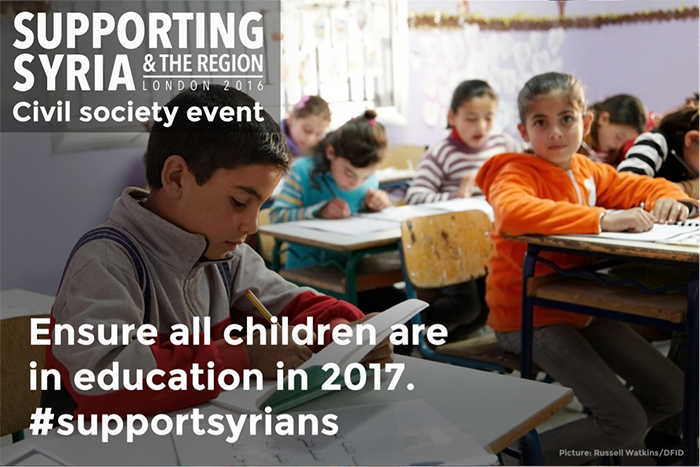What you need to know: Supporting Syria and the Region conference

Photo By Russel Watkins/DFID.
Nine billion: The amount of money (or just shy of it) that world leaders are calling on the international community to contribute to #SupportSyrians.
Four-and-a-half-million: The number of people currently fleeing violence in Syria, 1.3 million of which are children.
Six: The number of years conflict has disrupted Syrian refugee children’s education.
Twenty: The average number of years refugees are forced to spend living abroad.
As the Syria conflict stretches onward with no end in sight, the UK, Germany, Kuwait, Norway, and the UN will join government leaders, NGOs, the private sector, and civil society on February 4 for the fourth-annual pledging conference in London, formerly hosted by Kuwait. Their goal: To up the financing necessary to create both immediate and long-term solutions for those affected by the crisis.
At the top of their list is increasing access to education for all by the end of this school year — a mission that is ambitious and, just as importantly, doable. If they are to succeed, they will need more than just financing. Although a portion of the $750 million financing goal slated to educate one million children across Lebanon, Turkey, and Jordan has been met, the private sector can play a huge—and unique—part by leveraging their core assets.
During the Supporting Syria and the Region conference, the private sector will be convened by GBC-Education for the side-event, “No Lost Generation: Partnerships for Children Affected by the Syria Crisis,” co-chaired by the governments of Norway and the UK, in partnership with UNICEF.
However business can contribute, their leadership is critical as Sarah Brown says: “A challenge like this creates a space for business to really show how they can play a huge role, and make a fundamental difference to the lives of some of the most vulnerable children in the world. Our coalition members are not only supporting with money, but bringing their vast expertise, ideas, creativity, and connections to tackle this enormous challenge.”
What You Should Know
Three Main Goals:
- To raise the just under $9 billion needed to support the 2016 UN inter-agency appeals ($7.73 billion) and the national response plans of regional governments ($1.2 billion)
- To address the long-term needs of those affected – including providing education and creating jobs and economic opportunities
- To keep up pressure on those involved in the conflict to protect civilians – and be prepared to help the region become stabilised when the conditions are right
Format:
The one-day conference will consist of opening speeches from co-hosts followed by plenary sessions on topics ranging from creating economic opportunities and jobs, to protecting civilians from harm, to creating access to education. There will be side events that include an NGO conference and a business event on February 3 as well. View the Programming
The Participants:
Key donors will gather in London from around the world, including 70 world leaders, international organizations, NGOs, civil society, and the private sector. Members of GBC-Education will gather for a private sector side event taking place alongside the major conference.
Other Side Events:
The day before the conference, Bond, an international development network based out of the UK, will co-facilitate an NGO conference. They will focus on amplifying voices of the Syrian people in an effort to strengthen the humanitarian imperative to increase financing.
The European Bank for Reconstruction and Development will facilitate collaboration among businesses in an effort to strengthen the resilience of local economies.
Want to know more? Click here.
